
Brésil.
Curitiba, 30 septembre 2002
01h45 du matin, nous nous envolons pour Rio. C'est le dernier vol de la journée, et nous fermons l'aéroport de Madrid par la même occasion. Bye bye l'Europe, nous nous reverrons bientôt.RIO.
Nous atterrissons dans la matinée à Rio avec quelques 3 heures de retard, après un petit stop à São Paulo. Et pour cause, ce matin c'est la tempête à Rio et le pilote a préféré nous épargner cette épreuve. Délicate attention. Sur la route reliant l'aéroport à la ville, nous passons devant moultes arbres et panneaux publicitaires arrachés. Un petit air de 26 décembre 1999 en Gaule...Les premières visions de Rio, ce sont les nombreuses collines, la mer à leur pied et les favellas aggripées à leur flanc. Et puis les quartiers "trash" de la banlieue avec leur lôt de bâtiments gris, de ruines et de miséreux sur les trottoirs. Il pleut aussi.
Nous posons le camps dans le quartier de Copacabana, chez Moacir, un charmant Carioca qui loue une chambre dans son appartement. Il s'improvise gîte pour backpackers depuis 2 semaines et cela semble lui plaire. Une manière de s'occuper en attendant sa prochaine mission; Moa est biologiste pour la compagnie nationale de pétrole. Moacir est anglophone aussi, cela nous simplifie la tâche. Il nous offre le thé et nous passe quelques-uns de ses vinyls de Bossa Nova, histoire de nous mettre dans l'ambiance. Nous sommes au BRéSIL.
[1 Real ~ 2 FF]
Copacabana, plage. Première coco. Tournoi de futevolei, petit frère brésilien du beach-volley, sauf qu'on y joue avec tout le corps sauf les bras. Les joueurs sont d'une agilité stupéfiante. Le Brésil, pays du ballon rond. C'est surprenant la variété des traits et des couleurs de peau que l'on trouve chez les Brésiliens. Noirs africains, indiens, blancs, et toute la palette des mélanges. Le Brésil, pays du métissage. On imagine la culture de tolérance qui en découle.
Et puis Ipanema, l'autre. Le temps est gris, le ciel est bas, les nuages s'accrochent aux pics environnants, la mer est agîtée, les immeubles sont tellement proches du bord de mer qu'on les imagine tremper dans l'eau. On se croirait (presque) sur une plage du Pas de Calais - ça fera plaisir à Momo. Première Caipirinha, sous la bruine.
Corcovado, Pão de Açùcar. Vue d'en haut, la ville nous apparaît plus clairement, si seulement les nuages veulent bien se dissiper une seconde. Rio est faite de morceaux de villes encastrés entre les collines, et baignant dans l'eau. Lorsque la ville s'allume à la tombée de la nuit, c'est encore plus beau.
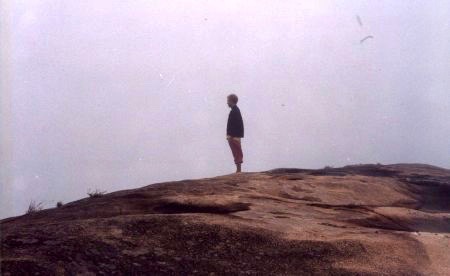
Rio, dans les nuages
PARATY.
Après quelques tentatives échouées, nous quittons Rio la magnifique et reprenons la route. Euphorie de remonter sur les vélos! Malheureusement pas pour longtemps. Première triche après 2 jours de pédalage et une centaine de kms. Le genou de Stef devient trop douloureux et nous devons prendre le bus pour rallier Paraty, 300 kms au sud de Rio sur la côte atlantique. Paraty est une jolie ville dans le style colonial portugais. Architecture simple et colorée, me rappelle l'architecture coloniale du Mexique. Les rues du centre sont pavées et, chose surprenante, inondables lors des hautes marées. Nous y restons quelques jours, espérant encore que quelques jours de repos supplémentaires suffiront à reposer le genou de Stef. Promenade en bateau, lecture sur la plage, ballade dans la montagne sur le Caminho do Ouro (la route de l´or) qui permettait d'acheminer l'or depuis l'intérieur des terres par les montagnes vers le port de Paraty. Nous vivons au calme, nous promenons dans les rues, discutons avec les gens au hasard des rencontres, on a le temps.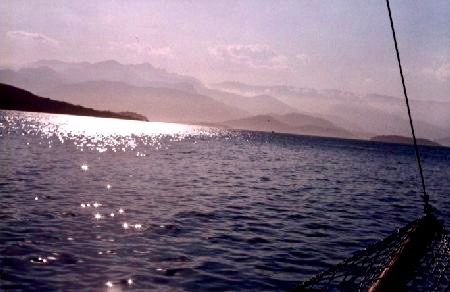
Paraty
Nous croisons Renato, le croate immigré au Brésil depuis 20 ans, une gueule d'ange, caricaturiste de rue. Nous nous offrons à son regard perçant et à son coup de crayon incisif. On n´est pas habitué à ce que quelqu'un vous scrute pendant 20 minutes, on est mal à l'aise. Mais on rigole franchement lorsqu'on se découvre sur papier. Bravo Renato, c'est plutôt ressemblant et tu m'as bien fait rire!
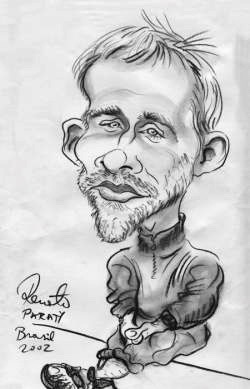
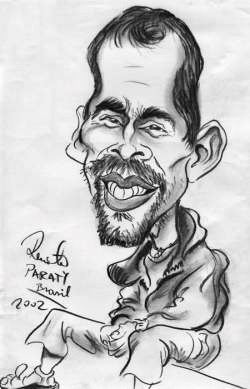
Et puis la belle Mercedes, argentine, qui a quitté Buenos Aires lassée de son existence et voudrait devenir une grande chanteuse. En attendant elle joue dans les petits restaurants de Paraty. Et c'est vrai qu'elle chante bien. S'accompagnant de sa guitare, elle berce avec des reprises de morceaux brésiliens, Bossa Nova virant parfois au Funk, des accords savants et doux qui vous rincent les oreilles. Et quelques morceaux des Beatles, "pour les touristes". Bonne chance Mercedes!
Quelque part sur la côte au sud de Paraty. Nous avons quitté Paraty ce matin. Au programme, 50 kms tranquilles (autant que possible sur une route qui monte et qui descend, parfois sévèrement). Après une longue ascension, nous avons quitté l'Etat de Rio et sommes entrés dans l'Etat de São Paulo. Tin tin tin. Paysage superbe, montagnes sur la droite, océan pas loin sur la gauche. Nous débarquons sur une plage immense, déserte. Le camping est sur la plage, désert aussi car hors saison. Le bar au bord de la plage est fermé, une petite cahute en bois toute mignone. On y trouve un panneau avec le prix des cocos. 2 Reais, hors de prix! On imagine la même cahute dans 2 mois, prise d´assaut par les estivants, le bar tourne bien, la musique est forte, rythmée, les shorts sont longs, les torses musclés et les strings tendus! Mais pour lors c'est le calme absolu, un havre de paix et de sérénité. ZEN. On est bien ici, on se sent voyager, on est unique l'espace d´un instant. Nous sommes des Robinson Crusoé.
Réveil au bord de la plage, le calme. 07h00. Il est tôt, je suis reposé. J'ai faim, je vais manger. Une douche froide pour se réveiller. Rien de plus. Hier nous avons fait un feu, mais pas n'importe lequel: c´est le premier du voyage.
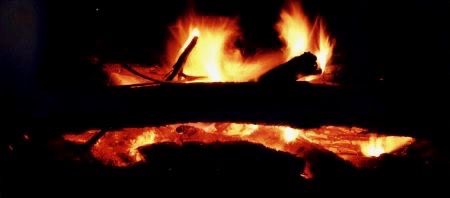
Picinguaba
Arrêt à Ubatuba, 30 kms au sud, où nous reprenons un bus car Stef ne peut plus continuer en vélo. Puis bref stop à Ilhabela, la plus grande île du Brésil, recouverte de jungle, dotée de plus de 300 cascades et moultes plages, sans grand intérêt en raison du mauvais temps persistant. Rappelons qu'ici nous sommes au début du printemps. Après quelques jours à attendre en vain le soleil, nous plions les gaules. Bus direction São Paulo.
SÃO PAULO.
São Paulo est une grande ville, pas spécialement jolie, mais pas complètement moche non plus. Je suis plutôt positivement surpris, par rapport à la description qu'en font les guides. Se méfier des guides! Le centre est animé, grouillant, et peuplé d'hommes-sandwich faisant la réclame pour tel ou tel magasin à 2 pâtés de maisons. On en trouve même qui porte des offres d'emploi. São Paulo est une ville de business, à l'inverse de Rio dont les plages et les montagnes environnantes en font une ville sensiblement plus orientée vers le tourisme.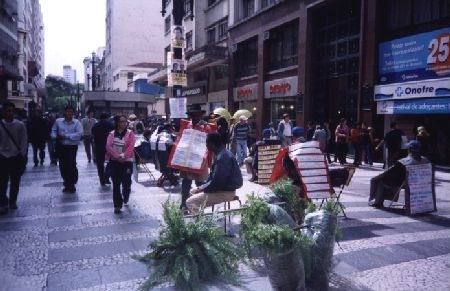
São Paulo, les hommes-sandwich
Après quelques semaines d'attente, j'exulte de pouvoir retrouver des bouquins en français. Nous passons notre première journée a São Paulo dans le centre, à fureter dans les librairies. Nombreuses librairies d'occasion où l'on trouve un rayon "anglais" et "français". On se laisse porter par ce que l'on trouve, au petit bonheur la chance, on fouine parmis les vieux livres, certaines éditions ont plus de 40 ans. Le rayon est un voyage à lui seul, on imagine que les étagères se sont remplies au gré des francophones passés par là. Cela attise la curiosité et l'envie de lire. St Exupéry côtoie le Club des Cinq, Sartre une édition du Petit Larousse de 1965. São Paulo nous offre même une librairie exclusivement française, exceptionnellement bien garnie.
On ne se prive de rien au niveau alimentaire - hormis l'eau du robinet of course, et même pas de tourista officiellement déclarée. Les derniers petits soucis intestinaux remontent à Madrid.
Bouffe au kilo, buffet à volonté pour 5 Reais, Burgers à 2 Reais: au Brésil on n´explose pas le budget alimentaire. Record battu a Curitiba ce jour même: 3,50 Reais pour un buffet à volonté. Avec 2,50 Reais de penalité si l´on ne finit pas son assiette. Faut pas pousser quand même.
Nous découvrons la cuisine brésilienne traditionelle dont une des composantes principales est le Feijão, plat à base de haricots rouges marinés avec saucisses et compagnie. Et la Farinha, racine de manioc râpée, ressemblant à de la chapelure. On aime déjà moins mais ça passe bien avec les haricots rouges et le riz.
Niveau boissons, nous dégustons moultes caipirinhas, batidas, caldo de cana, cocos (sur la plage exclusivement), et autres sucos com leite. Un REGAL. Voici en détail mon TOP 3:
- Sucos com leite (2 Reais)
C'est en gros le principe du Danao, sauf qu'ici tu peux boire ça à tous les coins de rue et la gamme des fruits proposée est large et exotique: banane, mangue, fruit de la passion, fraise, framboise, pêche, abricot, ananas et j'en passe. Prendre des fruits, de la glace et du lait, mélanger le tout dans un mixer et boire ça à la paille. L'essayer, c'est l'adopter!
- Coco sur la plage (1 Real)
1ère étape >> le gars te coupe à la machette la base pour que tu puisses la poser, taillade le haut de l’enveloppe et fait un trou dedans et tu bois ça avec une paille. Une fois terminée, tu peux passer a la 2ème étape
2ème étape >> le gars t’ouvre la noix de coco en 2 avec sa grosse machette et te coupe un petit bout de la coque verte pour te faire une cuillère qui te permet de gratter l'intérieur, une sorte de gelée de coco. Dieu que c´est exotique.
- Caipirinhas (3-4 Reais)
caip. = [citr. vert en tr. (1/2) + suc. (3 cuill. a caf.) + gl. + cachaça (bcp)]
La Cachaça, c'est la téquila brésilienne: de l'alcool de sucre de canne.
De manière surprenante, osons le dire, je cherche encore le dépaysement. Partout où nous passons, il y à des cafés-internet avec des jeunes qui jouent aux mêmes jeux en réseau qu'à l´autre bout de la terre; des supermarchés où l'on trouve les mêmes paquets de Corn-Flakes qu'à la maison; des gens qui boivent du Coca-Cola; et des McDo (c'est bon le McDo, mais on espérait autre chose ici)! Peut-être le dépaysement vient-il là où on ne l´attend pas. Peut-être n'existe-t'il que dans le souvenir, a posteriori, une fois rentré à la maison... On m'aurait menti?
La montée en puissance tant attendue n'a pas eu lieu. Allons-y gaiement de nos voeux pieux et gratuits: la Patagonie apportera-t-elle une autre dimension à ce voyage?
Au diable les plans à long terme, le voyage n'en a que faire! C'est bien d'improvisation qu'il s'agit. Coup dur pour l'épopée et changement partiel de programme: le genou de Stef est trop douloureux, Stef doit arrêter le vélo. Sur les 700 kms reliant Rio et Curitiba, nous n'en avons pédalés qu'une centaine. Le reste en bus avec les vélos en guise de sac à dos. Pratique! On s'en sort assez facilement malgré tout, les bus sont grands et nous pouvons la plupart du temps mettre les vélos dans les soutes. Stef va vraisemblablement renvoyer son vélo, le comment est encore à l'étude. Nous continuons ensemble en bus jusqu'à Buenos Aires en passant entre autres par les cascades d'Iguaçu. Stef continue en sac à dos. Moi je garde le vélo. A Buenos Aires, je remonte sur la selle, autour du 15 octobre, en solitaire cette fois-ci, direction la Patagonie, ses étendues désertes, ses VENTS... et espérons-le un peu plus d´aventure. C'est en tout cas le plan à ce jour, mais je me garderai bien d'affirmer qu´il n´y aura pas de nouveau changement!
Seb
---
As we all know, the definition of a plan is as follows: "A pointless waste of time spent on the definition of an unrealistic and unclear idea. A plan is typically based on distorted information, and its final goal will hardly ever be accomplished." (The concise English Dictionary, Oxford University Press).
Up to now the trip has been exactly as I thought it would be: totally unexpected. First, Sallie went her own way after only one month, and second, tendinitis on my right knee has forced me to give up the cycling and continue with a rucksack until further notice.
Madrid
31 August - 6 SeptemberWe were spoilt in Madrid by Diana and David, who received us with open arms. Having lived in Madrid for a year, I knew a few people there and it was great to catch up. Stuffed our faces with paëlla, jamon serrano, chupitos, cañas, loads of yum yum stuff. Enjoyed Madrid's lively nightlife.
At the airport, for our first flight, we were expecting a cross eyed man smelling of sweat giving us hassle about the bikes. "Terribly sorry Sir, the bike has to be placed in a cardboard box, pedals removed, wheels dismantled, handlebars straightened, saddle removed. Could we see the receipt for this bicycle sir? Could you sign this paper, stating that you agree that the airline cannot be held responsible if the bike is lost or broken? Thank you sir. Have a nice flight sir." Actually we were just asked to deflate the wheels. Bob is your uncle.
It suddenly occurred to me that up to now, the trip had been a warm up. Had we been ill, we had access to quick and reliable medical care. We could speak the language, we were familiar with the culture, places we went were pretty safe. From Rio onwards, these conditions we took for granted would probably change.
My height has its advantages, but they are not exactly obvious sitting in economy class in a plane for 11 hours; the man in front trying to lower his seat is wondering what the two bony bumps digging into his back are; the man behind me is complaining because he cannot see the TV screen; and the stewards wake me up every half hour to get the trolley past my knee. And I am scared of flying, especially when in the midst of a turbulence burst they tell us there is a storm in Rio and we won't be able to land.
Rio de Janeiro
7 - 13 SeptemberAnyway, we got to Rio safely. Sallie's family were there to greet us, good to see they are healthy and enjoying their world tour. Sallie will travel with her parents from now on, to meet up with us in Australia or somewhere else on the way.
We stayed in Rio for a week. The Youth Hostels were full, so we got a little backpacker's place in Copacabana, at the foot of a mountain. The landlord was Moacir, a Carioca (from Rio) marine biologist with a great peace of mind about him.
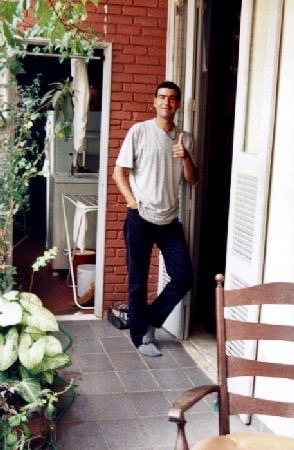
Rio, Moacir
We idled around Copacabana, the world's most famous beach. We had loads of corn on the cob and coconut milk. I remember when I first came back from Brazil and told all my friends that in Brazil they had a different type of coconut, it was green and bigger than the brown stringy ones we have in Europe. My bright mind never ceases to amaze me. We tasted the local Caipirinha, a drink with cachaça (a kind of rhum), bitter lemon, sugar and loads of ice, though I have to admit I'd had loads of that before. Weather was grey most days and it rained in the evenings, not quite the image we had of Rio.
We spent a day touring the city with South American Experience, with a busload of English geezers. We were the only 2 foreigners, and being French, we got our share of slagging. Eet eeze eencredeebul tu bee so deesrespectful, merde. Off the record, they were a great bunch of people. Went to the Tijuca National Park and watched a few people jump off a cliff with a folded plastic bag over their head, something they called handgliding. I didn't do it because 1) I didn't have the budget and 2) I could feel a substantial level of pressure building up in my bowels at the thought of such a jump. Took a wobbly tram over a dodgy viaduct to the old quarter of Santa Teresa, and went up to see the Corcovado in the mist. Great reggae concert that night.
For our last day in Rio, we managed to squeeze in another tourist attraction, the Pão de Açúcar, a great bar with an amazing samba concert, and a night out in Lappa with concerts in a street full of beer drinkers and spliff smokers. I say what, this decadent behaviour is most shocking, tally ho.
Rio de Janeiro - Paraty
13 - 15 SeptemberOk, time to go, my knee is not OK after 2 weeks of rest, anti-inflammatory cream and icepacks, but I want to keep going, we will see what happens.
The exotic start on Copacabana, Ipanema and Leblon beaches quickly disappeared, yielding the way to a congested and polluted dual carriageway through a 3km tunnel and a massive flyover. I believe I may have grown my first grey hair. After another quiet stretch along the beach and another 10 kms along roadworks in the dark, we stopped in Recreio for a coconut, where people told us we might get our heads violently chopped off if we continued along t he next beach in the dark. We camped in Recreio.
Great news, first thing in the morning, my knee was throbbing like the organ of a male hippo in a state of tremendous sexual frustration. After 1km, we got to a massive hill, the most intense we'd had so far. Sitting on the saddle was not possible as the front wheel would lift off the ground. The rest of the day was spent on long straight roads with the wind in our face and my knee sending loads of little messages to my brain saying "could you stop please?". The next morning that was it, I let Seb know we would have to take the bus, with the objective of resting until Buenos Aires at least. Booo hoooo. So we grabbed a bus to Paraty and set camp.
Paraty
15 - 19 SeptemberThe camping that cost 5 Reais (1.6 euros) per night was in fact someone's back garden that looked suspiciously like a dump. Paraty is a very nice place, loads of well preserved colonial buildings. Used to be a port from where the Portuguese shipped gold back to Europe. Irregularly paved streets, some of them swallowed by the ocean at high tide. Loads of affectionate, flea-infested stray dogs everywhere, and beaches all around. A bit of atmosphere would have been nice, the place was very quiet. But no confusion there, we were spot on the tourist trail as we met up with Dan, Matt and George, who were with us on the day tour in Rio. We also bumped into Sallie and her family, well, went out so, caught up with a bit of craic, like.
In Paraty I also bumped into my worst enemy up to now on this trip: Mr Maracuja, mixed with Cachaça in a glass with a few ice cubes. This nasty little fruit turned my stomach round and round and attacked me from both the northern and southern fronts for 2 days. Now if you say maracuja to me I feel ill.
A few walks around the bay, a boat tour and a few quiet nights out later, off we went from Paraty. The plan was to get to Trinidade and its lovely beaches, and camp there for a few days. Because bus connections would be quite bad from Trinidade, we would cycle slowly to Ubatuba, 80kms down the coast.
Paraty - Ilhabela - São Paulo
19 - 24 SeptemberSo off we went, pedalled for a few hours and when we asked someone how far the turning for Trinidade was, he told us it was 20kms away - in the wrong direction. Fantastic. Well, we gave up the idea of Trinidade and cycled on. Did a bit of shopping in the last chance saloon, a petrol station in the middle of nowhere. The only thing around us was high green hills, with very dense vegetation, empty shacks on the side of the road, and beautiful ocean views to our left. Found a long empty beach, checked in the campsite, pitched the tent, went for a swim, and stuffed our faces in front of the fire with the soothing sound of the ocean in the background.
Now, I don't want to complain or anything, but I would strongly recommend they feed the mosquitoes round here. Our legs became a rugged, bloated, dark purple blob covered in bloody volcanoes. I'd been bitten by mosquitoes before, but they'd never left open holes in my skin before. I have filed a complaint with the Sao Paulo State Insects Department, they are looking into the issue and will get back to me as soon as they can.
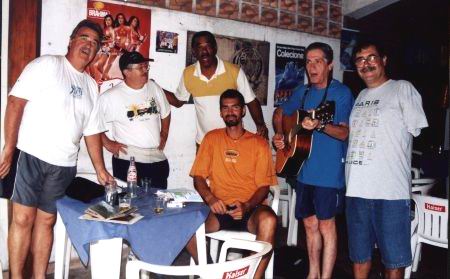
Ubatuba
Another 30kms along the Costa Verde and we were in Ubatuba, where we were greeted by a bunch of tipsy guys drinking Pinga (same as Cachaça). They gave us a concert, we gave them one. One of them, a really sweet guy from Portugal - who happened to have only one arm - gave me a tour round the city, took me to see the fishmongers, bought me a drink. Once again, I missed an opportunity to shut up when I asked him if he wanted to play a game of pool. Goof is my second name.
The owner of the bar asked us to come back to sing later on that evening, so we prepared a few songs for 3 hours only to find that the bar was totally empty. We could have been famous!
Made our way down the coast to São Sebastião the next day, where we caught the ferry to Ihlabela, a major tourist resort for Paulistas (people from São Paulo) in high season. When we got there was particularly low season, and the weather was deplorable. Described to us as a great outdoor activities place where you could rent almost anything, hike to wonderful waterfalls and all that goes with it, we found the place a little dead.
So a few days later we moved on to São Paulo. Putting bikes in buses has proved to be really easy up to now. No hassle, nothing to dismantle, no extra charges. And no damage to the bikes because they rested on the pannier bags inside the bus' luggage compartment.
Waiting for the bus to São Paula, we tasted sugar cane juice, called caldo de cana. Very sweet. Difficult to imagine that all that juice comes out of a crushed bamboo stick.
On the way to São Paulo, we followed the coast for a while, then climbed inland up the steep hills. A few fazendas, dense green vegetation with loads of weird plants, red earth, and then I fell asleep dreaming about the cows I saw on Ilhabela. Strange, those cows, they look like monsters in Star Wars. In my dream, one of them winked at me suggestively and I woke up. We had arrived in São Paulo.
São Paulo
24 - 29 SeptemberThe reputation of São Paulo is terrible. We were told by tourists to avoid it, there is nothing interesting, it is dangerous, polluted. We thought it was far from being that bad.
The youth hostel was really comfortable, so we stayed in reading and chilling for a few days. We played trivial pursuit, probably a version for people with limited culture because we got questions such as "What was Rambo's first name?". And there were questions in Flemish which of course we mastered skillfully.
We toured around the centre, supposedly oozing with pickpockets. Loads of individual salesmen selling inconsistent bits and pieces, especially asian-imported electronical goods. What was the most surprising was recruitment agencies advertising jobs through these sandwichmen stuck between 2 noticeboards. Nothing outrageous about São Paulo, we were expecting much worse.
While we were there, we went to the snake farm, where we saw s nakes (surprisingly enough), but also scorpions, frogs, spiders, and those large lizzards, I can't think of their name now.
Curitiba
29 September...We arrived yesterday. This place is supposed to be Brazil's example of urban success. Little pollution, low criminality, great transport, no traffic, free internet access all around the city, a street opened 24 hours. It certainly looks quite prosperous around here.
The hostel is empty, there are 2 of us in a 40-bed room. There was blood on the stairs as we walked up. Over Seb's bed there is a trap door leading to the attic. Suspicious sounds were heard in the middle of the night, we thought it was the wind blowing branches onto the roof. But it was not windy last night. tun tan tun tan tun (scary music).
In the next few weeks we plan to head down to the coast to Paranagua, then head to the beautiful waterfalls at Iguaçu. Then we should be on our way to Buenos Aires.
-----------------
Overall, the news could be a little better. I am very pissed off regarding my knee, but such is life. And we never know, I might be back on the bike in a few months. As soon as I have figured out what to do with my bike, I will buy a backpack and keep going, by bus, along the original route. Seb will continue on his own for a while at least, cycling. Hope everything is going well in Europe. Keep sending us some news, it's nice to hear from the real world, a place we will have to get back to at some point...Take care and keep in touch!
Stefan
---
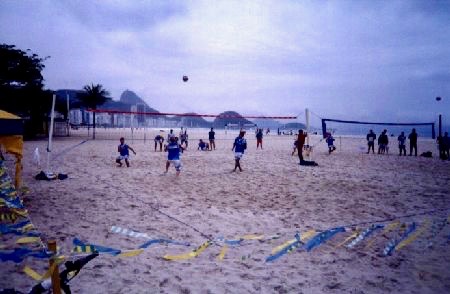
Copacabana, futevolei
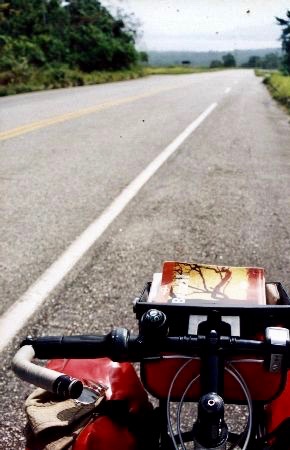
Sur la route, les premiers kms dans l'Etat de São Paulo
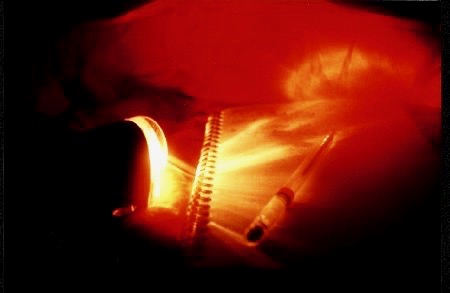
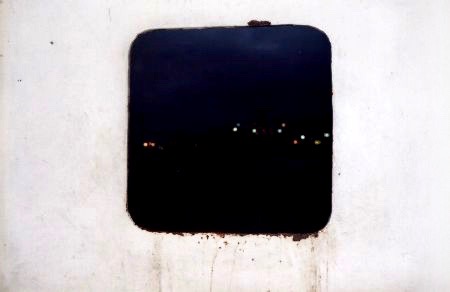
Qu'est-ce que c'est?
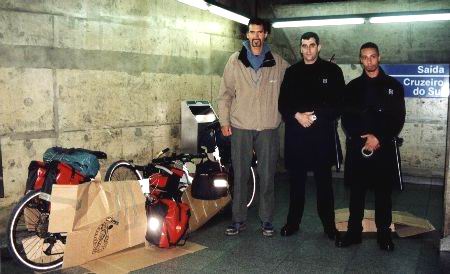
São Paulo, démontage des vélos pour prendre le métro

